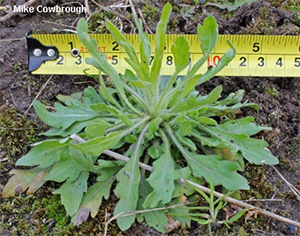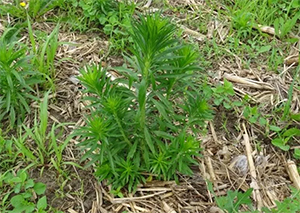If you wish to have Canada fleabane tested for resistance, please contact:
Kristen Obeid
kristen.obeid@ontario.ca
519-738-1232 (desk)
519-965-0107 (cell and text)
@WeedProfesh (twitter)
We need leaf tissue from 10 different Canada fleabane plants in your orchard or vineyard. We then perform analysis on the plants’ DNA using PCR (Polymerase chain reaction) amplification. Results can be completed within 2 days and then you will know for sure whether or not you have glyphosate resistant Canada fleabane in your fields. If you do, then we can develop a management strategy to manage this weed.
Canada fleabane (also known as horseweed or marestail) is a winter annual weed. Its seed will germinate either in late summer and over-winter, or in the spring.

Figure 1. Canada fleabane rosette just starting to bolt. Adequate control will occur at this growth stage or smaller with post-emergence herbicides.

Figure 2. Bolted Canada fleabane. This is the stage that most plants are at right now.
Effective management strategies should focus on removal of seedling plants both in the fall and in the early part of spring. Since small fleabane plants are not deeply rooted, many different types of tillage implements provide good control of this weed.
Source : ONfruit